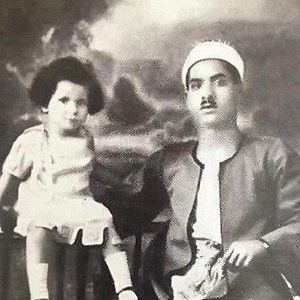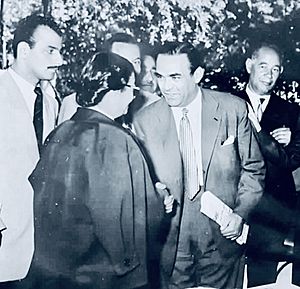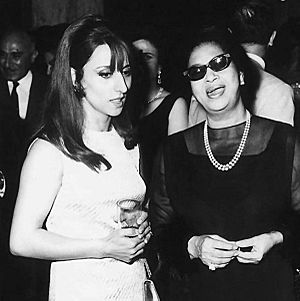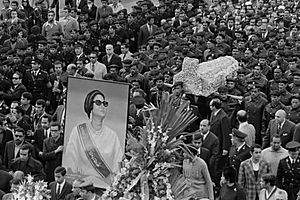Umm Kulthum facts for kids
Quick facts for kids
Umm Kulthum
|
|
|---|---|
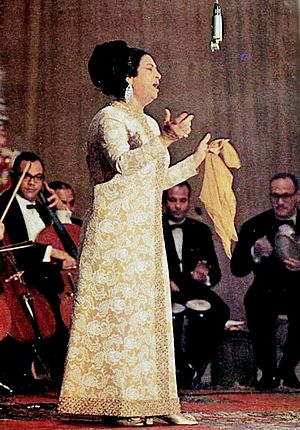 |
|
| Background information | |
| Native name |
أم كلثوم
|
| Birth name | Umm kulthum Ibrahim as-Sayed El-Beltagi أم كلثوم إبراهيم السيد البلتاجي |
| Born | 31 December 1898 Tamay Ez-Zahayra, El Senbellawein, El Dakahlia, Egypt |
| Died | 3 February 1975 (aged 76) Cairo, Egypt |
| Genres | Egyptian music, classical |
| Occupation(s) |
|
| Years active | 1923–1973 |
| Labels | Odeon His Master's Voice Cairophon Sono Cairo Mazzika EMI Classics EAC Records |
| Associated acts | El Asabgy Sayed Darwish Baligh Hamdi Abdel Halim Hafez El Sunbati Mohammed Abdel Wahab |
Umm Kulthum (born Fatima Ibrahim es-Sayyid el-Beltagi; 31 December 1898 – 3 February 1975) was a famous Egyptian singer, songwriter, and film actress. She was active from the 1920s to the 1970s. People called her "Kawkab al-Sharq," which means "Star of the East." She is known as "The Voice of Egypt" and even "Egypt's Fourth Pyramid" because she was so important to her country.
Contents
Life Story of Umm Kulthum
Early Life and Talent
Umm Kulthum was born in a small village called Tamay e-Zahayra in Egypt. Her father, Ibrahim El-Sayyid El-Beltagi, was a religious leader (an imam). She learned to sing by listening to her father teach her older brother. From a very young age, everyone could see she had an amazing singing talent.
Her father also taught her to recite the Quran, which is the holy book of Islam. She was so good that she reportedly memorized the entire book! When she was 12, her father asked her to join the family's singing group. To help her father feel more comfortable about her performing in public, she would wear a boy's cloak and a head covering.
When she was 16, a well-known singer named Mohamed Abo Al-Ela noticed her. He taught her many old classical Arabic songs. A few years later, she met a famous composer and musician named Zakariyya Ahmad. He encouraged her to move to Cairo, the capital city. She moved there permanently in 1923. In Cairo, she learned to play the oud, which is a string instrument like a lute.
Starting Her Professional Career
In Cairo, Umm Kulthum became part of the city's cultural scene. In 1924, she met a poet named Ahmed Rami. He wrote 137 songs for her and became her main guide in Arabic literature. She also met a famous oud player and composer, Mohamed El Qasabgi. He helped her perform at the Arabic Theatre Palace, where she became very successful.
By 1930, Umm Kulthum was so famous that many young female singers looked up to her. In 1932, she went on a big tour across the Middle East and North Africa. She performed in major cities like Damascus, Baghdad, Beirut, and Tunis.
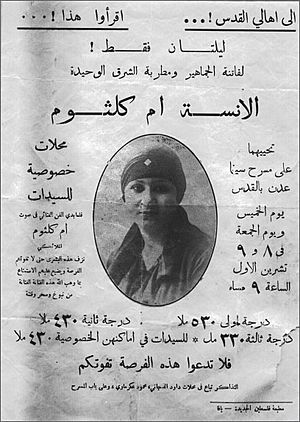
In 1934, Umm Kulthum sang for the very first broadcast of Radio Cairo, which was the country's main radio station. After that, she performed a concert on the first Thursday of every month for forty years! Her influence grew so much that even the royal family of Egypt would ask her for private concerts and attend her public shows.
In 1944, King Farouk I of Egypt gave her a very high honor, usually only given to royal family members or politicians. However, the royal family did not approve of her marrying the King's uncle. This made her sad and led her to focus more on supporting the common people. For example, she sang for Egyptian soldiers trapped during the 1948 Arab–Israeli War. Many of these soldiers later became leaders of the 1952 revolution, including Gamal Abdel Nasser.
After the revolution, some people tried to ban her songs from the radio because she had sung for the old King. But President Nasser stopped this, saying, "Do you want Egypt to turn against us?" Nasser even planned his speeches so they wouldn't clash with Umm Kulthum's radio concerts.
Umm Kulthum's popularity helped Nasser's political goals. Her concerts were often followed by his speeches. She sang many songs supporting Nasser, and they became close friends. One of her songs, "Wallāhi Zamān, Yā Silāḥī" ("It's Been a Long Time, O Weapon of Mine"), was even the Egyptian national anthem from 1960 to 1979.
She also gave many concerts to support the Egyptian military. Her monthly concerts were so popular that streets in busy cities would become empty as people rushed home to listen to her on the radio.
Her songs were mostly about love, longing, and loss. A typical Umm Kulthum concert would have two or three songs and last for three to four hours. She was known for her amazing ability to improvise. She would often repeat a line from a song many times, changing her voice and emotions each time. This would create a powerful feeling for the audience, known as "tarab."
In the 1930s, she started working with poet Ahmad Rami and composer Mohammad El-Qasabgi. Their songs included European instruments like the cello. In 1936, she acted in her first movie, Weddad. She starred in five more movies during her career.
The Golden Age of Music
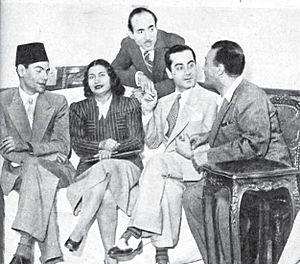
The 1940s and early 1950s are known as Umm Kulthum's "golden age." During this time, she started singing songs that felt more traditionally Egyptian. She worked with composer Zakariya Ahmad and poet Mahmud Bayram el-Tunsi.
She also began working closely with a younger composer named Riad Al-Sunbati. His melodies were very beautiful and popular with her audience. Their collaborations created many songs that Egyptians loved and still enjoy today.
In 1946, Umm Kulthum sang a religious poem in classical Arabic called "Salou Qalbi" ("Ask My Heart"). It was a huge success and reminded people of her early singing days. She sang other similar poems, including "Woulida el Houda" ("The Prophet is Born") in 1949.
In 1950, at the peak of her career, she sang "Rubayyiat el Khayyam," which was a translation of famous Persian poems. Another one of her signature songs is "Al-Atlal" ("The Ruins"), which she first performed in 1966.
Umm Kulthum's concerts were famous for their length. She would often sing for up to five hours, performing only three songs. This was because she would repeat lines and improvise based on the audience's reactions. This special connection with her audience was a big reason for her success.
Around 1965, Umm Kulthum started working with another famous composer, Mohammed Abdel Wahab. Their first song together was "Enta Omri" ("You Are My Life"), which became incredibly popular. After Egypt's defeat in the Six-Day War in 1967, her songs took on a more thoughtful and emotional quality. She also performed concerts to celebrate the formation of the United Arab Emirates in 1971.
Death and Funeral
Umm Kulthum passed away on 3 February 1975, at the age of 76, due to kidney failure. She was working on new songs at the time of her death. Her funeral was a huge national event in Egypt. About 4 million Egyptians lined the streets to see her funeral procession. It was even larger than the funeral of President Gamal Abdel Nasser. People were so emotional that they took her coffin from the bearers and carried it themselves to the Al-Azhar Mosque. She was buried in a special tomb in Cairo. Her death was a great loss for Egypt and was reported by news outlets around the world.
Her Amazing Legacy
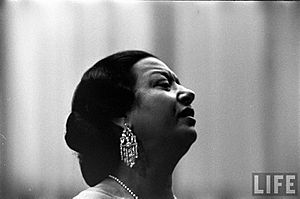
Umm Kulthum is considered one of the greatest singers in the history of Arab music. She has influenced many musicians, both in the Arab World and beyond. Famous artists like Bob Dylan, Maria Callas, and Bono have praised her music. Youssou N'Dour, a singer from Senegal, even recorded an album in 2004 as a tribute to her. Many of her songs, like "Enta Omri" and "Alf Leila wa Leila," have been covered and reinterpreted by other artists.
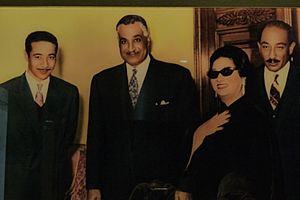
People called her "the Lady" and "the Incomparable Voice." Even today, she is almost a legend among young Egyptians and across the Arab world. In 2001, the Egyptian government opened the Kawkab al-Sharq ("Star of the East") Museum in her memory. It displays her personal items, like her famous sunglasses and scarves, along with photos and recordings.
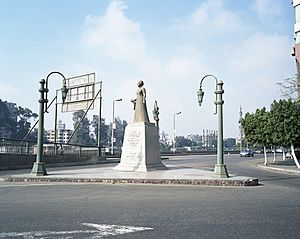
Her performances mixed deep emotion with messages about politics. She was very influential and often spoke about political topics through her music, especially after World War II. Her songs, even if they seemed to be about love, could have deeper meanings about political situations. Her musical influence is still felt today, not just in Egypt but in many other Middle Eastern countries and globally.
Her Unique Voice
Umm Kulthum was a contralto singer, which means she had a very low female singing voice. Some say she could sing across an incredible range, from very low to very high notes. Her voice was so powerful that she had to stand three feet away from the microphone! She was famous for her ability to improvise and would never sing a line the same way twice. She learned to adapt her voice to the meaning and melody of the songs, which is a traditional Arabic singing style.
Remembering Umm Kulthum
Umm Kulthum is still remembered in many ways. A pearl necklace with 1,888 pearls, which she received from Zayed bin Sultan Al Nahyan, is now displayed at the Louvre in Abu Dhabi. For 40 years after her death, Egyptian radio stations would play only her music at 10 PM on the first Thursday of each month, in her memory.
In 2019, at a festival in Saudi Arabia, a live concert was performed where she "appeared as a hologram" with an orchestra. Hologram concerts featuring her have also been held in Cairo and Dubai.
Famous Songs
| Year | Title | Translation | Label | Lyricist | Composer |
|---|---|---|---|---|---|
| 1944 | Ghaneely Shwaya Shwaya (from the film "Sallama") |
Sing Softly for Me | Orient | Bayram al-Tunisi | Zakaria Ahmed |
| 1946 | Walad Al Hoda | Child of Guidance | Cairophon | Ahmed Shawki | Riad Al Sunbati |
| 1960 | Howa Saheeh El Hawa Ghallab | It's True That Love Is Overpowered | Sono Cairo | Ma'moun El Shinnawi | Baligh Hamdi |
| 1961 | Hayyart Alby | You Confused My Heart | Philips | Ahmed Rami | |
| 1962 | Ha Seebak Lezzaman | I'm Going to Leave You | Mohammed Abdel Wahab | Riad Al Sunbati | |
| 1963 | Betfakker Fe Meen | Who Are You Thinking of | Sono Cairo | Ma'moun El Shinnawi | Baligh Hamdi |
| La Ya Habibi | No My Love | Philips | Abdel Fattah Mustafa | Riad Al Sunbati | |
| Lel Sabre Hedoud | Limits to Patience | Sono Cairo | Mohammed El Mougi | Mohammed Abdel Wahab | |
| 1964 | Seeret Hob | Love Story | Morsi Gamil Aziz | Baligh Hamdi | |
| Inta Omri | You Are My Life | Ahmed Shafik Kamel | Mohammed Abdel Wahab | ||
| 1965 | Inta Al Hob | You're Love | Ahmed Rami | ||
| Amal Hayaty | Hope of My Life | Ahmed Shafik Kamel | |||
| 1966 | Al Atlal | The Ruins | Ibrahim Nagi | Riad Al Sunbati | |
| Fakkarouny | They reminded Me | Mohammed Abdel Wahab | Mohammed Abdel Wahab | ||
| Hagartak | I Left You | Ahmed Rami | Riad Al Sunbati | ||
| 1967 | Hadeeth El Rouh | The Language of the Soul | Mohammed Iqbal | ||
| El Hob Keda | That's How Love Is | Bayram al-Tunisi | |||
| Awedt Eni | I Got Used to Your Sight | Ahmed Rami | Riad Al Sunbati | ||
| Fat Al Mi'aad | Too Late | Morsi Gamil Aziz | Baligh Hamdi | ||
| 1968 | Ruba'iyat Al Adawiya | The Quatrains of Adawiya | Tahar Aboufacha | Riad Al Sunbati | |
| Hathihy Leilty | This Is My Night | Mohammed Abdel Wahab | Georges Gerdaq | ||
| 1969 | Alf Leila W Leila | 1001 Nights | Morsi Gamil Aziz | Baligh Hamdi | |
| Aqbel Al Leil | The Night Is Coming | Ahmed Rami | Riad Al Sunbati | ||
| Arooh Lemeen | Who Do I Go to | Abdel Munaim al-Siba'i | |||
| 1970 | Es'al Rohak | Ask Yourself | Mohammed El Mougi | Mohammed Abdel Wahab | |
| Zekrayat | Souvenirs | Ahmed Rami | Riad Al Sunbati | ||
| El Hob Kollo | All the Love | Ahmed Shafik Kamel | Baligh Hamdi | ||
| Ruba'iyat Al Khiyam | The Quatrains of the Tents | Ahmed Rami | Riad Al Sunbati | ||
| W Marret Al Ayam | And the Days Passed | Ma'moun El Shinnawi | Mohammed Abdel Wahab | ||
| 1971 | Al Thulathiya Al Muqaddassa | The Holy Tercet | Saleh Gawdat | Riad Al Sunbati | |
| Mesh Momken Abadan | Impossible At All | Ma'moun El Shinnawi | Baligh Hamdi | ||
| El Alb Ye'sha' | The Heart Loves | Bayram al-Tunisi | Riad Al Sunbati | ||
| Aghda Al'ak' | Longing for You | ||||
| Al Amal | Hope | Zakaria Ahmed | |||
| 1972 | Raq El Habib | Vengeance of the Lover | Ahmed Rami | Mohamed El Qasabgi | |
| Lasto Fakir | I'm Still Thinking | Abdel Fattah Mustafa | Riad Al Sunbati | ||
| Ya Masharny | The One Who's Keeping Me Up | Ahmed Rami | Sayed Mekawy | ||
| 1973 | Hakam Alayna Al Hawa | We're in the Hands of Love | Mohammed Abdel Wahab | Baligh Hamdi | |
| Ahl El Hawa | The Lovers | Bayram al-Tunisi | Zakaria Ahmed | ||
| Yally Kan Yeshguik 'Anni | Whoever Talked to You About Me | Ahmed Rami | Riad Al Sunbati | ||
| Sahran La Wahdi | Up on My Own | ||||
| Daleely Ahtar | I'm Confused | ||||
| 1974 | Shams El Aseel | The Lovers | Bayram al-Tunisi | ||
| Ana Fe Intizarak | I"m Waiting for You | Zakaria Ahmed | |||
| 1975 | Ya Toul 'Azaby | My Suffering | Cairophon | Ahmed Rami | Riad Al Sunbati |
| Sallou Alby | Entertaining My Heart | Relax-In | Ahmed Shawqi | ||
| Ozkourini | Think of Me | Cairophon | Ahmed Rami | ||
| Aghar Min Nesmat Al Gnoub | Jealous of the Southern Breeze | Sono Cairo | |||
| Al Oula Fel Gharam | The Best at Falling in Love | Bayram al-Tunisi | Zakaria Ahmed | ||
| 1976 | Misr Tatahaddath 'an Nafsaha | Egypt Speaks of Itself | Hafez Ibrahim | Riad Al Sunbati | |
| Helm | Dream | Bayram al-Tunisi | Zakaria Ahmed | ||
| Al Ahat | The Groans | ||||
| Arak Assi Addame' | I See You Crying | Abu Firas al-Hamdani | Riad Al Sunbati | ||
| 1978 | Sourat Al Shakk | Doubt | Abdallah Al Faisal |
Movies She Starred In
- Weddad (1936)
- Nashid al-Amal (The Chant of Hope) (1937)
- Dananir (1940)
- Aydah (1942)
- Salamah (1945)
- Fatmah (1947)
See also
 In Spanish: Umm Kalzum para niños
In Spanish: Umm Kalzum para niños
 | Laphonza Butler |
 | Daisy Bates |
 | Elizabeth Piper Ensley |


